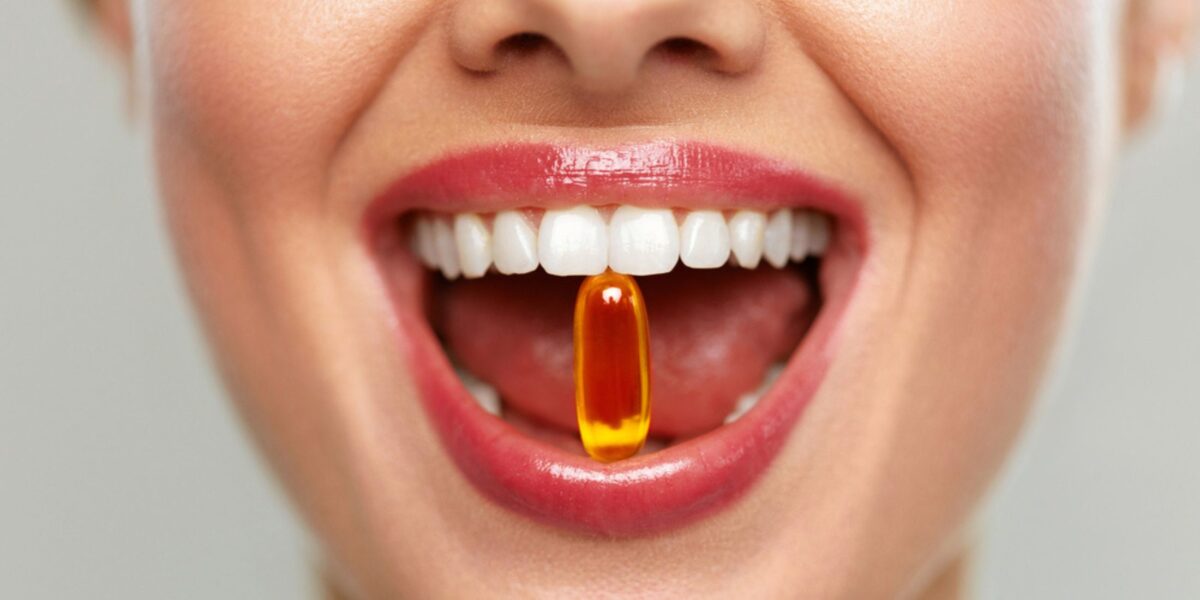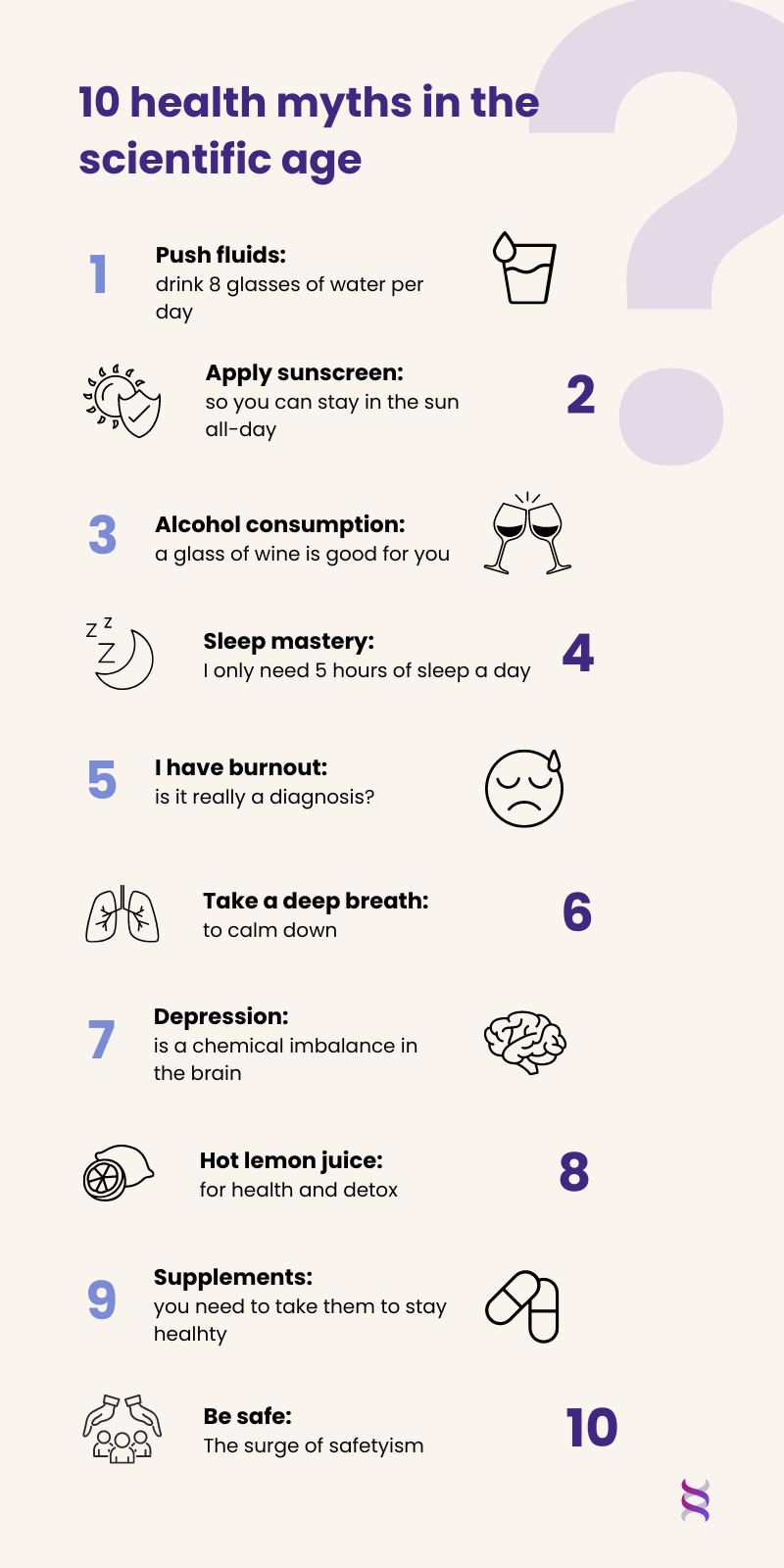
Ten Health Myths in the Scientific Age
The rise of evidence-based medicine and, specifically, the well-being trend is a wonder. The aim is to increase the quality and quantity of life. Despite all this knowledge, we still show remarkable gullibility. Businesses seek a need, manipulate data, make wild claims, and profit from our stupidity. Many myths might be doing your harm.
Without being too serious, here are the big myths that drive some crazy behaviour. We examine the myth, challenge the claims, explore negative consequences, and propose a remedy.

Debunking the myth of 8 glasses of water per day
Apart from extreme heat or exercise, dehydration in healthy adults is rare. Young children and older adults are vulnerable in heat. Our thirst drive is VERY resilient. When the body needs fluid, it will find a way. Overhydration (hyponatremia) causes way more hospitalisation and death than dehydration. The sugar added to most bottled drinks contributes to obesity, diabetes and cardiovascular disease.
We currently use 1.5 billion plastic bottles per day. This is a major threat to ecosystems, and the chemical effects on hormonal health remain under debate. If we put this money into safe drinking fountains—problem solved. Drink to thirst PERIOD
Sunscreen: is it really necessary?
Humans pour $10 billion of sunscreen over their bodies and the environment. Yes, sunscreen can block UV light and reduce sun damage and skin cancer to a degree. If you are stuck in the midday sun, this may make sense. Protective clothing is better. Sunscreen users believe that it allows them to sunbathe through the middle of the day. Without this delusional belief, no intelligent being would lie out in the midday sun.
No one should lie out in the midday sun. Our bodies need morning and afternoon sun to produce Vitamin D. Sunscreen blocks it leading to a wide range of health risks. The chemical and plastic impact on the ocean and coral is negative. Various chemicals in sunscreens may have hormone-blocking effects on users.
The solution is to buy good protective clothing if you have to be in the midday sun. If not, stay in the shade and enjoy the morning and afternoon sunshine. We can safely relegate sunscreen to history.
Alcohol is good for you
Sadly, the myth of the French Paradox has quietly died. Even red wine no longer stacks up. Alcohol is officially a health risk with no benefits. The combined cost of alcohol abuse is astronomical—violence, road accidents, cancer, mental illness, broken families and lost productivity.
Can you enjoy a beer with a mate or a glass of wine with dinner? Of course. Celebrate in moderation. Just don’t kid yourself that it is good for you.
I only need 5-hours of sleep a day
Sleep experts unanimously emphasise the need for 6.5 to 8 hours of sleep. At 5 hours per night, you cannot wake up that better version of yourself. You increase the risk of cancer, cardiovascular disease, obesity, diabetes, dementia, mental illness and inflammation. Find a way to meet your human sleep need.
If we fix our sleep, we will make a real impact on mental illness and productivity, let alone the quality of our life.
I have burnout (no, you don’t)
Burnout was never meant to be a clinical diagnosis, and it has become an epidemic as attention-hungry consultants and journalists catastrophise work. If you experience the kind of energy depletion and cynicism described, you probably have depression. Best to get on with accepting and managing it.
Yes, work can be demanding, but we must accept responsibility for maintaining reasonable boundaries and caring for our physical, emotional and mental well-being. Burnout is no better than “nervous breakdown” or the “vapours”. Maintain your rhythm and learn to bounce.
Take a deep breath! Why is it a bad advise
When you take a deep breath, the default is to inhale through the mouth, jack up your heart rate and activate your sympathetic system. It is bad advice. This article is our most widely read blog, with thousands of views per month.
The correct practice under pressure is to exhale slowly and entirely through the nose. This will slow your heart, restore vagal tone and create coherent heart rate variability. You will feel better, your health is restored, and you can think and connect again. Get good at this and establish eight minutes of slow diaphragmatic breathing daily.
Depression is a chemical imbalance in the brain
The idea that low serotonin causes depression and can be fixed by SSRIs (sustained serotonin reuptake inhibitors like Prozac) is a fabrication to maximise the sales of antidepressants. There is no evidence for this. Instead, depression is a complex condition involving activation of the freeze reaction without recovery. There are many effective solutions. For example, exercise is 1.5 x more effective than antidepressants and counselling. Time in nature, yoga, meditation, healthy eating (Mediterranean diet) and thinking skills are also proving more effective than medication. The abuse of medications for the mind is astronomical and rising fast since Covid.
Consume hot lemon juice for health & detox
Detox diets are a fallacy. The digestive system is way smarter than that; it is not some tube you can simply flush out. Firstly, your gut works with about 50 trillion bacteria. A healthy diet and lifestyle keep this biome healthy. When healthy, it supports your mental and physical well-being. Stay fit, eat plenty of vegetables and fibre (again Mediterranean) and maybe fast for a day or two a week.
Detox diets are a delusion for simple minds. The worst is a cup of hot lemon juice in the morning. The acidity will erode your tooth enamel. If anything, faecal microbiota transplants (pooh pills) can help re-establish health-cut bacteria.
Supplements keep you well
Our willingness to suck down handfuls of pills with wild claims on their bright little plastic bottles is perhaps the worst offender. Consistent scientific studies fail to show any class A evidence. Maybe nicotinamide (Vitamin B3) for skin cancer and Vitamin D (sun without sunscreen is best). Dump the rest. Save a fortune. Call the scams. Protect our environment. Trust your body.
Be Safe. Why staying safe can have negative effects
The surge in safety thinking and practice is well past the point of diminishing returns. I call this safetyism. It is great that we have reduced motor vehicle and work accident deaths. We can prepare wisely for risky undertakings. ‘Be safe’, ‘keep safe’, ‘keep them safe’, ‘travel safe’, etc. It is really dull. In fact, many of us lie blatantly to keep others ‘safe’—or maybe to protect ourselves.
Life is an adventure. Rewards follow risk. Adversity stimulates growth. Truth generates trust. Resilience and bounce stimulate growth and character. If we look at our health indicators, this generation of safetyism increases the risk of physical, emotional and mental fragility. Our children are suffering and stunted. There is a tension between caution and risk. We should aim to help people master that tension. If not, we may as well upload consciousness to the internet and absent ourselves from the mess and joy of a life lived well.
Negotiating the myths
- Observe nature and learn about our evolution. Nature is wisdom.
- Check to see if the advocate is making money from the myth. Reject it.
- Get your basic daily rhythms working—sleep, exercise, relaxation, diet.
- The solutions are inside. Master your body, your emotions and your thoughts.
- Be independent, trust yourself and take some risks.
